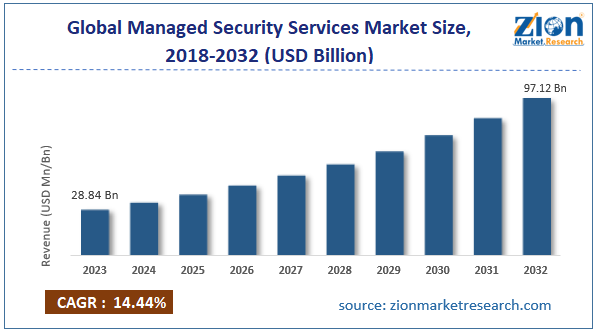Introduction:
Managed Security Services (MSS) have become indispensable for organizations grappling with the escalating complexity and sophistication of cyber threats. MSS providers offer a range of security solutions and services, including threat detection and response, vulnerability management, compliance monitoring, and security consulting, to protect businesses from cyberattacks and data breaches. The Managed Security Services market has experienced rapid expansion in recent years, driven by the growing volume and severity of cyber threats, increasing regulatory scrutiny, and the rising demand for outsourced security expertise. In this report, we delve into the size, share, analysis, trends, and growth forecast of the Managed Security Services market, shedding light on its evolving landscape and future prospects leading up to 2032.
Market Size and Share:
Forecasts indicate that the global managed security services market will grow from an initial valuation of $28.84B in 2023 to a final valuation of $97.12B in 2032, a compound annual growth rate (CAGR) of about 14.44%.

The Managed Security Services market encompasses a diverse array of offerings, including Security Information and Event Management (SIEM), Managed Detection and Response (MDR), Endpoint Detection and Response (EDR), Security Operations Center (SOC) services, and security consulting and advisory services. As of the latest data, the market size for Managed Security Services is significant, with leading MSS providers and cybersecurity firms competing to capture market share and expand their service portfolios. The market share is distributed among established MSS vendors, managed service providers (MSPs), telecommunications companies, and cloud service providers offering integrated security solutions.
Market Analysis and Trends:
- Rising Cyber Threat Landscape: The proliferation of cyber threats, including ransomware, phishing attacks, insider threats, and zero-day exploits, has heightened the demand for Managed Security Services. Organizations are increasingly outsourcing their security operations to MSS providers to leverage their expertise, threat intelligence, and advanced technologies to detect, respond to, and mitigate cyber risks effectively.
- Shift Towards Cloud-Based Security Solutions: The adoption of cloud-based security solutions is gaining momentum as organizations migrate their infrastructure and workloads to the cloud. MSS providers are offering cloud-native security services, such as Cloud Access Security Broker (CASB), Cloud Security Posture Management (CSPM), and Secure Web Gateway (SWG), to protect cloud environments and address the unique security challenges posed by cloud adoption.
- Focus on Threat Detection and Response: Managed Detection and Response (MDR) services have emerged as a key focus area for MSS providers, enabling organizations to augment their security capabilities with 24/7 threat monitoring, incident detection, and response orchestration. MDR combines advanced analytics, threat hunting, and incident response expertise to detect and neutralize threats across endpoints, networks, and cloud environments.
- Integration of AI and Automation: MSS providers are leveraging artificial intelligence (AI) and automation technologies to enhance the efficiency and effectiveness of security operations. AI-powered threat detection algorithms, machine learning models, and security orchestration platforms enable MSS providers to automate routine tasks, triage alerts, and prioritize security incidents, allowing security analysts to focus on high-value activities and strategic initiatives.
Request For Customization: https://www.zionmarketresearch.com/custom/8210
Growth Forecast for 2032:
The Managed Security Services market is poised for continued growth and innovation in the coming years, driven by:
- Increasing adoption of Managed Security Services by small and medium-sized enterprises (SMEs) seeking to bolster their cybersecurity posture and compliance readiness.
- Expansion of MSS offerings to address evolving threats and compliance requirements, including managed detection and response, incident response, and threat intelligence sharing.
- Integration of Managed Security Services with emerging technologies such as Internet of Things (IoT) security, DevSecOps, and extended detection and response (XDR) to protect digital assets and mitigate cyber risks across hybrid and multi-cloud environments.
- Collaboration and partnerships between MSS providers, technology vendors, and industry stakeholders to develop integrated security solutions, threat intelligence sharing platforms, and best practices for threat prevention, detection, and response.
Conclusion:
In conclusion, the Managed Security Services market presents significant growth opportunities for MSS providers, organizations, and technology vendors seeking to enhance their cybersecurity resilience and defend against evolving cyber threats. By outsourcing their security operations to trusted MSS providers, businesses can gain access to specialized expertise, threat intelligence, and advanced technologies to proactively detect, respond to, and mitigate cyber risks. As the threat landscape continues to evolve, the Managed Security Services market is expected to play a pivotal role in safeguarding digital frontiers and enabling organizations to navigate the complex and dynamic cybersecurity landscape in 2032 and beyond.



